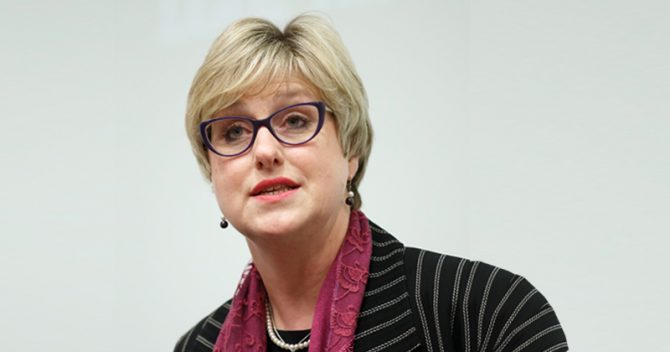Part-time evening courses were once a route that allowed tens of thousands of adults to retrain. But government funding cuts have seen this long tradition begin to fade away. As one champion of the provision enters Downing Street, Billy Camden delves into the current offer in colleges across England and questions whether this form of education could soon be resurrected
Night schools might be in for a revival following Baroness Alison Wolf’s appointment as a skills policy adviser to the prime minister.
The academic, who advises Boris Johnson three days a week, gave evidence to the education select committee just four months ago in which she raised the issue in the context of declining adult education numbers.
“The main problem is that we have completely destroyed any sort of easy infrastructure of proper institutions in all towns where you can go to evening classes briefly, where you can go for a while, come out and go back,” she told MPs.
“That used to exist in every town in this country. The ghosts of it are there, but it needs to be revived.”
In its 2019 report on education spending in England, the Institute for Fiscal Studies (IFS) found that adult learner numbers have fallen from 4.4 million in 2004-05 to about 1.5 million in 2017-18.
Funding for classroom-based and community learning peaked at around £4.1 billion in 2003-04, falling by nearly two thirds by 2018-19.
The IFS said there has been a “large and deliberate shift from classroom-based to apprenticeship training” in that time.

Evening courses, which are typically run between 6pm and 9pm, have reportedly borne the brunt of this.
It is an issue that has reached the House of Commons in recent years. Labour MP David Lammy held a parliamentary debate on the topic in 2017 in which he called for their return.
But there is little research that specifically shows the numbers of evening courses currently on offer, and how that compares to previous times.
FE Week spoke to colleges with large adult education budget allocations in the biggest cities in England to gain an insight into how their night school offer has changed over the years – including one in London that has bucked the trend of declining numbers.
But starting in the west, City of Bristol College said that it put on over 350 courses in the evening which had more than 3,730 enrolments in 2013/14, but this dropped by almost half to just over 1,900 enrolments in 2018/19 when 217 courses were offered.
A range of night classes continue to be offered this year including in sign language, biology, vehicle restoration, marketing, HR, law, welding, floristry and graphic design.
But the college’s principal, Andy Forbes, said the “frustrating thing is that we know we could run far more adult evening classes than we do now” and the biggest barrier is “that we now have to charge fees for courses”.
“Colleges that have experimented by running free courses have shown how big the demand is, but most FE colleges – like City of Bristol College – are not in a strong enough financial position to take the risk,” he added.
“We need funding to do this properly.”
Ann Marie Spry, vice principal for adult education at Leeds City College, said they are “proud” to offer over 100 adult evening courses currently, including in areas like start your own business, languages for beginners and Tai Chai.
While the college couldn’t give an estimate of numbers in previous years, “we did have to reduce the number we offer” owing to “cuts in funding”.
A spokesperson said: “Supporting low skilled workers and adults with mental health issues is an integral part of our work, and it’s important that we continue to be responsive to local community needs.
“We would welcome additional public funding to widen our scope and create a sustainable and robust adult offer.”
South and City College Birmingham said it reduced evening and weekend classes “substantially when the adult funding was cut and the rules on funding changed, as part of the austerity measures”.

A spokesperson said: “Adult funding rates are 60 per cent of 16 to 18 but young adults are provided with the same education and training in the same classes as 16 to 18 year olds.
“We would definitely re-introduce evening classes if there was funding to do so.”
Nottingham College said while it does still offer a range of courses in the evening, including in ceramics, photography, counselling and computing, there are “fewer than in previous years”.
“This could be attributed to less demand, changes in funding, the focus on employability and end-of-course outcome, and a decline in many of the courses that people would term hobbies or leisure.”
Liz Bromley, chief executive of NCG, said her college group still offers a range of evening courses in management and professional subjects, creative industries and education, as well as adult English and maths.
But “yes, we have reduced the number,” she told FE Week, adding that a steep decline started at the time of the introduction of advanced learner loans – a policy which has struggled to get off the ground since its introduction in 2013.
“Changes to funding eligibility also added to this decline,” Bromley said.
“The reluctance to take up the adult learner loans seems to be linked to a lack of disposable income – i.e., once the course is complete, I will have to pay back my loan, and if I have not had a pay rise, then I’m financially worse off.”
She added: “We would like to see much more flexibility around the eligibility criteria for funding of course that have a direct link to the local skills agenda.”
There is one college group which is stemming the tide of declining evening courses: Capital City College Group (CCCG).

One of its divisions, The College of Haringey, Enfield and North East London (CONEL), ran fewer than 10 evening classes three years ago, but last year they ran 142 in areas including the trades, ESOL, sports massage and accounting.
What’s more, all of them up to level 2 are “free” of charge.
In June 2018 the Greater London Authority announced that adults in the capital who earn less than the London living wage will have their training fully funded from 2019/20 for courses up to level 2.
After experiencing what it calls “significant success” with the GLA’s policy – it saw in excess of one-third more adults enrolling – CCCG extended this offer to all adult learners.
Kurt Hintz, the principal of CONEL, said: “The appetite for learning in adults is huge, the barrier is cost. When it’s free, it’s full.”
But, he added, level 3 continues to be an issue: “Current funding stops at level 2. Many adults are discouraged from progressing to level 3 as they have to take out a loan.
“It is at level 3 and above that incomes start to increase significantly. By not funding courses at this level, members of our community are prevented from maximising their potential.”
David Hughes, chief executive of the Association of Colleges (AoC), summed up by saying evening provision “still exists but is smaller in volume, adding that many of the ‘leisure’ courses, so popular for evening programmes, have significantly decreased in number”.
“AoC would welcome policy changes and funding to accompany it which allows for the most responsive and flexible provision.”









I went to college two nights a week for two years to gain my D32, D33, and D34 plus my Level 4 in Teaching Office Practices. I also did some typing courses, also audio typing. This at the time was difficult but I paid for it and saw the value. It had big classes and people attended so I value it.